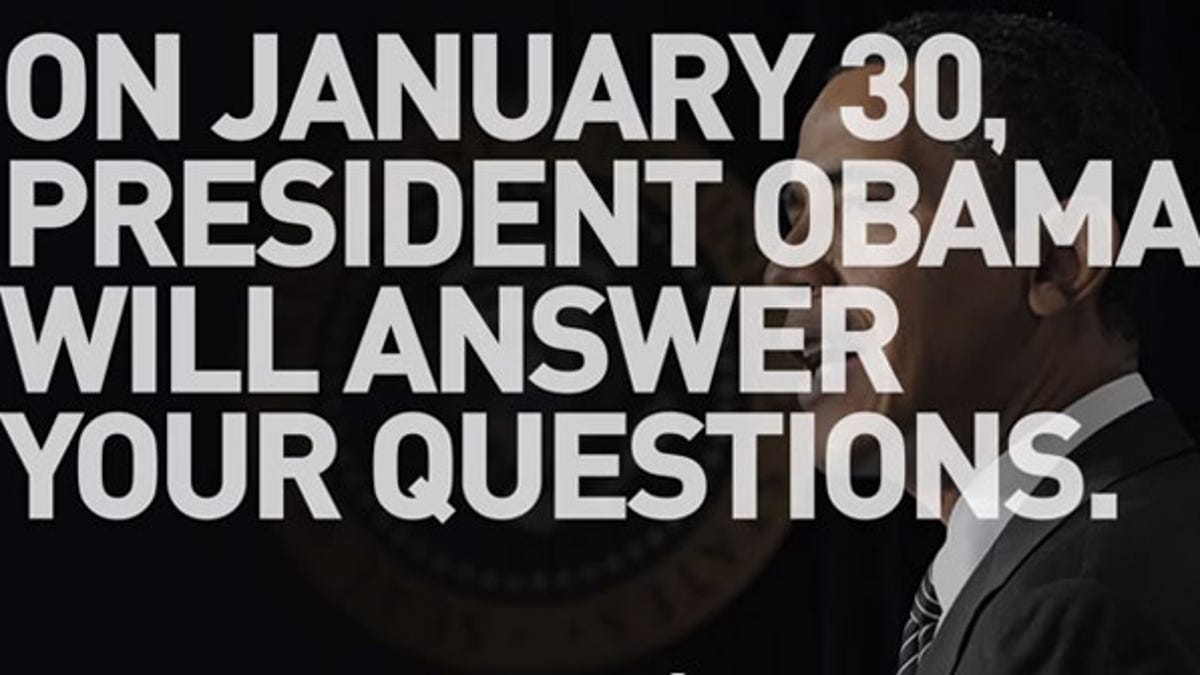Obama to Internet: Hang out with me on Google+
Selected people will get to participate in a video "hangout" with Obama, who last week sided with Google to help thwart Draconian copyright bills.

Having worked for years to connect with voters on the Internet, President Obama will actually hang out with some in a Google+ video chat.
Later this month, Obama will meet with selected members of the public in a videoconference chat using the Google+ hangout feature on January 30, said Ramya Raghavan, YouTube's news and politics manager, in a blog post yesterday.
It won't be just anybody, though. People must submit questions at the White House's YouTube page, either in text or 20-second video form.
"Your YouTube questions will drive the interview, and several participants with top-voted questions will be selected to join the president in the Google+ hangout to take part in the conversation live," Raghavan said. (Presumbably the selection process will aim to screen out shenanigans such as 2009's successful effort to spotlight the issue of marijuana legalization.)
Politicians conversing with constituents is nothing new, but there's a bit more to this story. Obama's use of Google+ is a feather in the cap for Google's fledgling social network--and it's salt in the wounds of erstwhile Hollywood allies who last week watched as Google helped derail cherished antipiracy legislation.
Obama has worked hard to use social media on the Internet to forge connections with voters. In addition to his Obama Google+ page, there's an Obama Facebook page, an Obama Twitter feed, and a Obama Flickr photo site.
Obama has already held a Twitter town hall and a YouTube Q&A session, and he met with Facebook employees earlier this year, taking selected questions the public submitted online. Google+ is only his latest techno-outreach effort.
Such electronic interactions are an obvious move for a modern politician. Essentially, the Internet has provided successors to nineteenth-century whistlestop campaigns run from trains, twentieth-century fireside chats held over the radio, and other technologies that have given politicians louder megaphones.
The Obama administration's enthusiasm for new-era communications helps it avoid looking out of touch with current technology trends.
For example, compare Obama's Net outreach to that of Sen. Dianne Feinstein, a Democrat from California who supported the now-squashed PIPA antipiracy legislation. Tech blogger Danny Sullivan sent Feinstein a telegram criticizing her PIPA stance, the obvious lesson being that her absence from Facebook, Twitter, and Google+ showed her to be ill-equipped to understand the modern Internet.
And nobody wants to be saddled with the reputation of former Sen. Ted "Series of Tubes" Stevens, derided for his explanation of the Internet's inner workings.
PIPA and its House counterpart, SOPA, died a noisy death last week after Google, Facebook, Wikipedia, and other prominent tech sites took a stance against what they saw as overreaching, technically flawed antipiracy legislation. That opposition got a boost when the Obama administration raised SOPA and PIPA concerns.
Essentially, the administration came down on the tech industry's side of the debate. Note also that Google Executive Chairman Eric Schmidt has been an Obama advisor since the presidential campaign. Obama also appointed Twitter CEO Dick Costolo to the National Security Telecommunications Advisory Committee.
Currying favor with tech businesses can bring problems, though. Apparently Obama's SOPA opposition is seen in Hollywood as a betrayal, and Motion Picture Association of America (MPAA) Chairman Christopher Dodd threatened retribution after SOPA and PIPA were thwarted. The entertainment industry has been a traditional stronghold of Democratic support, so surely Obama thought his position through carefully before so blatantly alienating Hollywood by putting SOPA on the ropes.
There's already tension between tech businesses and Hollywood. Net services such as Netflix, Spotify, Hulu, Amazon, and Apple's iTunes distribute ever more of what the movie, TV and music industries put out. YouTube now streams more than 4 billion videos a day while funding development of its own original material. The vast majority of the music, video, books, and movies being transmitted digitally comes from traditional studios, publishers, and labels, but they're being dragged through the digital revolution more than they are leading it.
Obama's attempt to cultivate a techno-savvy image likely will bring some unpleasant side effects. But really, who'd want to bet against the Internet?

